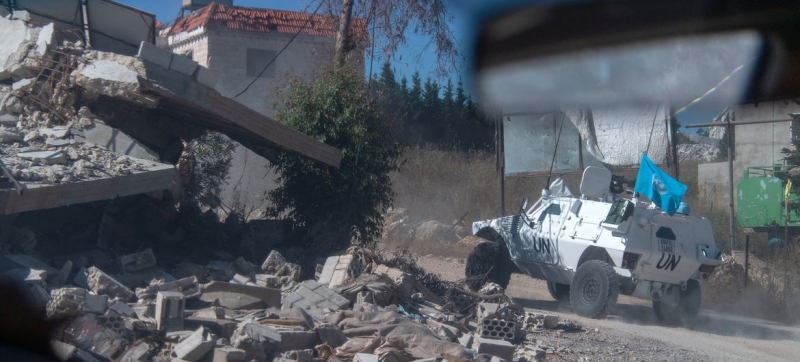
A UNIFIL convoy near the village of Houla in southern Lebanon in July 2024. EXPLAINED | Security Council Resolution 1701, the Blue Line and UNIFIL UN
Security Council Resolution 1701 has been the focus of both formal meetings and the margins of the global forum during the recently concluded High-Level Week at UN Headquarters. Discussions continue amid a sharp escalation in fighting between Israel and Hezbollah, the armed group that, along with its allies, holds 62 of Lebanon’s 128 elected seats in the parliament.
Here’s what you need to know about the landmark resolution that has underpinned peace between Israel and Lebanon for nearly two decades, and the 10,000 UN peacekeepers who support its implementation.
Security Council Resolution
Resolution 1701, unanimously adopted in 2006, aims to stop the fighting between Hezbollah and Israel. The UN Security Council called for a permanent ceasefire and the establishment of a buffer zone.
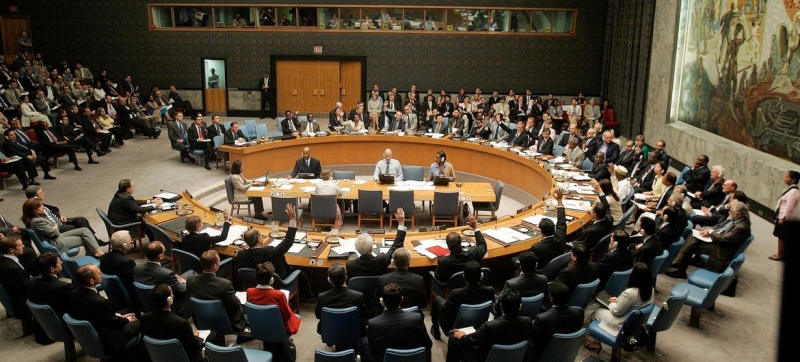
The UN Security Council unanimously adopted Resolution 1701 in 2006.
In the resolution, the Council decided to take steps to ensure peace, including authorizing an increase in the size of the United Nations Interim Force in Lebanon (UNIFIL) to a maximum of 15,000 troops. They are, among other things, obliged to monitor the cessation of hostilities, provide support to the Lebanese Armed Forces following the withdrawal of Israeli troops from southern Lebanon, and ensure the safe return of displaced persons.
Under the resolution, UNIFIL continues to carry out its activities under a mandate originally established by the Council in 1978 and renewed every year.
What are the main provisions of the resolution?
A key element of the 19-point resolution is its call for a complete cessation of hostilities based, inter alia, on an immediate cessation of all attacks by Hezbollah and an immediate cessation of all offensive military operations by Israel.
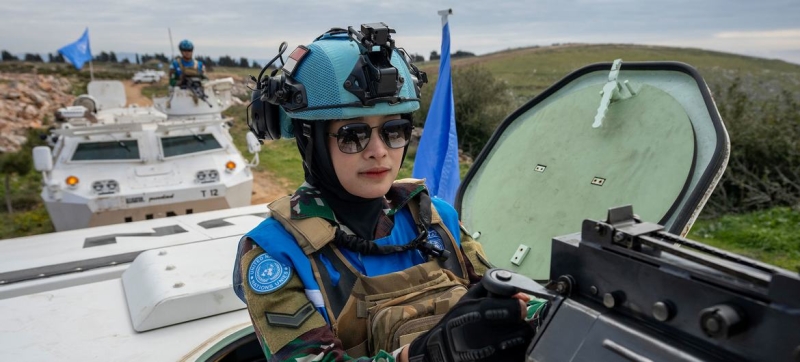
UN peacekeepers patrol the demarcation line between Lebanon and Israel.
The resolution also calls on Israel and Lebanon to maintain a permanent ceasefire and a durable solution based on the following principles:
- full implementation of the relevant provisions of the Taif Accords and resolutions 1559 (2004) and 1680 (2006), which demand the disarmament of all armed groups in Lebanon so that there are no weapons or authority in the country except in the hands of the Lebanese state;
- no foreign forces in Lebanon without the consent of the Government;
- a ban on the sale or supply of arms and related materials to Lebanon except with the permission of its Government;
- provision to the UN of all remaining and Israeli-held maps of mines in Lebanon;
- full respect by both sides for the Blue Line and for security measures to prevent a resumption of hostilities, including an area free of all armed personnel, forces, assets and weapons other than those of the Lebanese authorities and UNIFIL between the Blue Line and the Litani River.
What is the Blue Line??
Stretching for 120 km between southern Lebanon and northern Israel, the so-called Blue Line is one of the central elements of Resolution 1701.
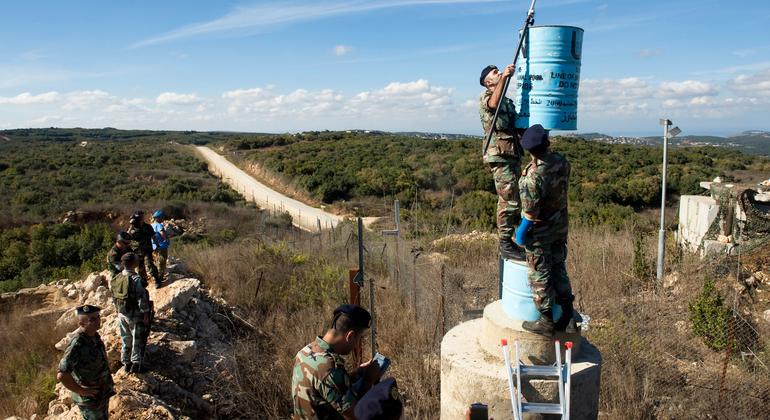
The Blue Line is not a border, but a temporary withdrawal line established by the UN in 2000 for the practical purpose of confirming the withdrawal of Israeli troops from southern Lebanon. The area is temporarily patrolled by UNIFIL peacekeepers.
Whenever Israeli or Lebanese forces wish to carry out any activities near the Blue Line, UNIFIL requests that they be notified in advance, which will allow the UN mission to brief all parties and minimize any misunderstandings that could lead to increased tensions.
How Resolution 1701 Works in Practice?
Ultimately, it is up to Israel and Lebanon to determine the exact location of the future border, and until then, UNIFIL is mandated to ensure full compliance with the relevant provisions of Resolution 1701 and prevent violations.
“Any crossing of the Blue Line by either side is a violation of UN Security Council Resolution 1701, and we, as UNIFIL, address all violations accordingly,” the Department of Peacekeeping Operations said in a statement peace.
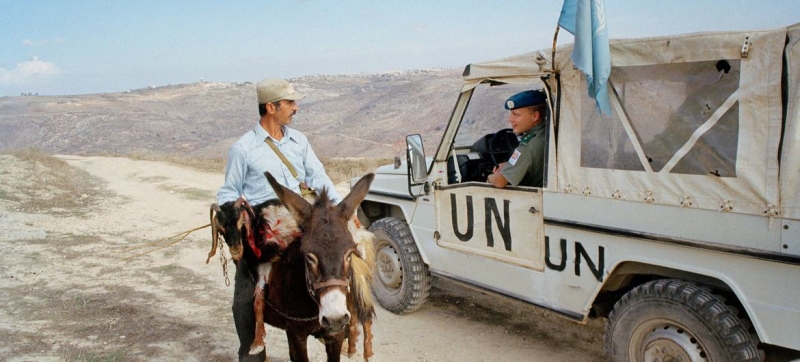
A UNIFIL peacekeeper and a local resident in southern Lebanon.
UNIFIL monitors the situation along the Blue Line, including the airspace above it, and coordinates, liaises and patrols to prevent violations. The UN mission reports all violations to the Security Council. The Council requests reports on the implementation of resolution 1701 every four months.
Whenever an incident occurs on either side of the Blue Line, UNIFIL immediately deploys additional troops to the location if necessary to avoid direct conflict and ensure containment of the situation. At the same time, the mission liaises with the Lebanese Armed Forces and the Israel Defense Forces to end the crisis and prevent further escalation.
Current situation on the ground
Fighting along the Blue Line intensified a year ago. The escalation began after Hamas-led attacks in Israel killed more than 1,000 people and took another 250 hostages in Gaza. The ensuing war in the enclave has led to a humanitarian crisis. As of October 1, nearly 42,000 people, more than 200 humanitarian workers and nearly 200 journalists have died in Gaza.
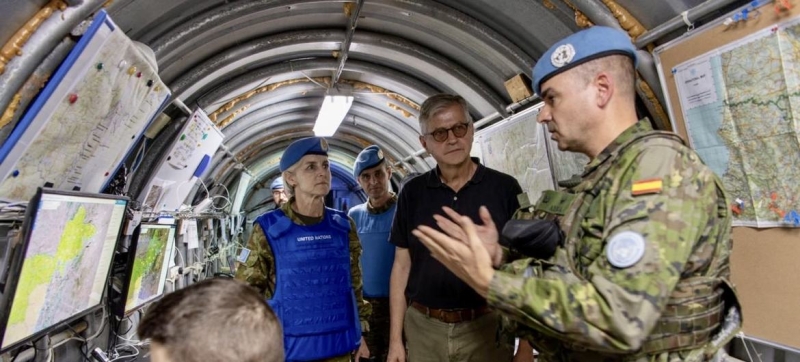
Under-Secretary-General for Peace Operations Jean-Pierre Lacroix stressed the need for de-escalation during his visit to Lebanon.
Hezbollah officials have told the media that its attacks against Israel demonstrate solidarity with the Palestinians. The Israeli military has responded with airstrikes, including inside Lebanon, across the separation line, bombings of communications devices, and now ground operations. More than a million people have been forced to flee their homes in Lebanon as a result. The ongoing violence has also forced some 60,000 people in northern Israel to flee, according to media reports.
While most of the strikes were limited to a few kilometers on either side of the Blue Line, several have reached 130 kilometers inside Lebanon and 30 kilometers inside Israel. Between 8 October 2023 and 30 June 2024, UNIFIL recorded attacks along 15,101 trajectories, of which 12,459 were from south to north and 2,642 were from north to south.
The ongoing cross-Blue Line shooting since October 8, 2023, is a violation of the cessation of hostilities and Resolution 1701, the UN Secretary-General said in a letter to the Security Council in late July.
What’s Next?
On September 30, the Israel Defense Forces notified UNIFIL of its intention to undertake a limited ground incursion into Lebanon, according to a statement issued on Tuesday.
“Despite this dangerous development, the peacekeepers remain in their positions,” UNIFIL said. “We regularly adjust our posture and activities, and have contingency plans that we can activate if absolutely necessary.”
The mission reiterated that the safety of peacekeepers is of utmost importance and reminded all parties of their obligation to respect this principle. UNIFIL currently continues to man its bases and perform some duties, but is unable to conduct vehicle patrols.
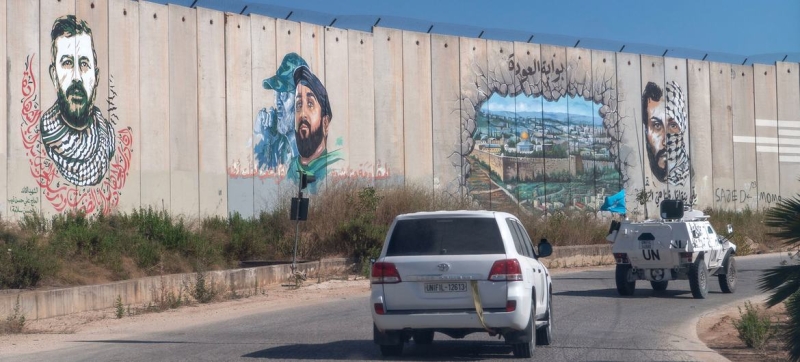
UNIFIL convoy in southern Lebanon in July 2024.
Israel has reportedly ordered civilians to evacuate some villages in the area. Meanwhile, the UN has reminded that civilians must be protected even if they choose not to evacuate.
“Any crossing of the border into Lebanon is a violation of Lebanon’s sovereignty and territorial integrity, and a violation of resolution 1701,” UNIFIL said. “We call on all parties to refrain from escalatory actions that will only lead to more violence and more bloodshed. The cost of continuing on the current course of action is too high.”
Stressing that civilians and civilian infrastructure must be protected from attack, UNIFIL called on the parties to reaffirm their commitment to “resolution 1701 as the only viable solution to restore stability in the region.”
Can UNIFIL use force??
Yes, under certain circumstances.
UNIFIL, whose mandate is extended annually by the Security Council at the request of Lebanon, is a peacekeeping mission operating under Chapter 6 of the Charter of the United Nations.
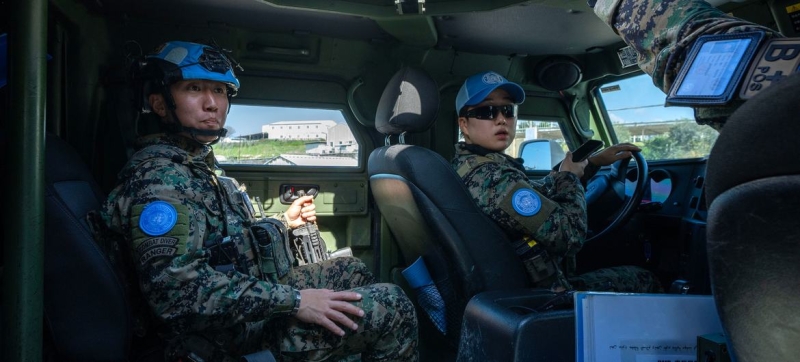
UNIFIL peacekeepers.
In carrying out their mandate, UNIFIL personnel may exercise the inherent right of self-defence. Outside self-defence, UNIFIL may, in appropriate circumstances and conditions, resort to proportionate and progressive use of force to:
- ensure that an area controlled by UN forces is not used for hostile activities;
- resist attempts by force to interfere with UNIFIL in the performance of its duties in accordance with its authorized mandate;
- protect UN personnel, installations, facilities and equipment;
- ensure the security and freedom of movement of UN personnel and humanitarian workers;
- protect civilians under imminent threat of physical harm violence.
